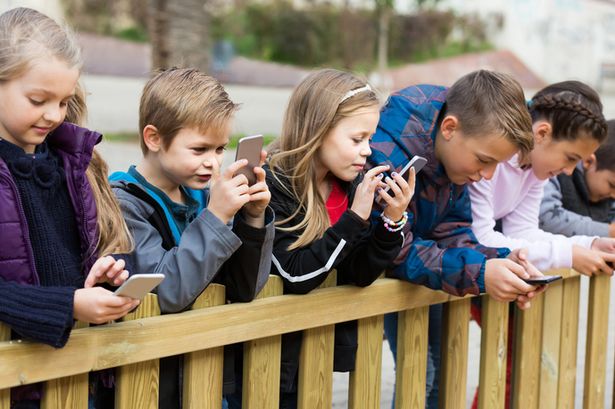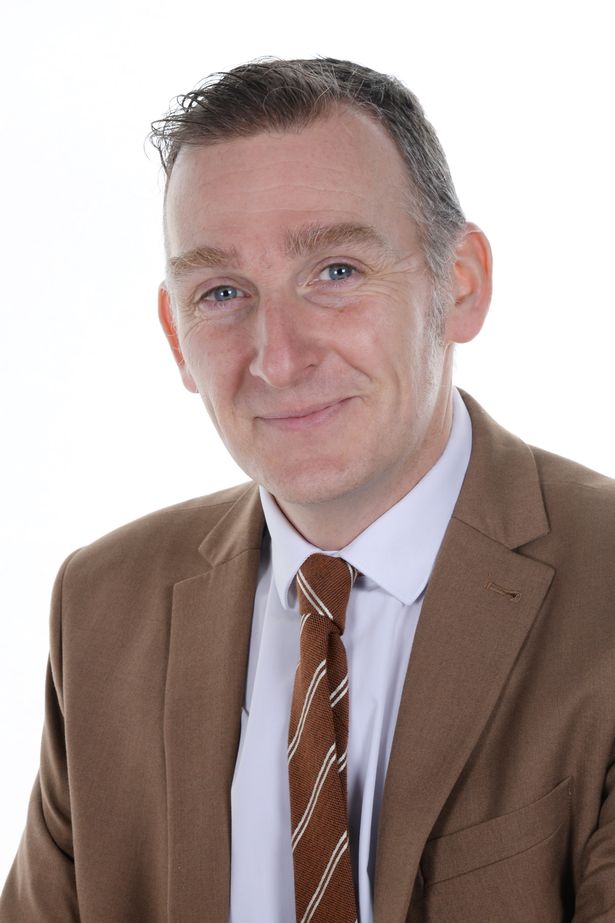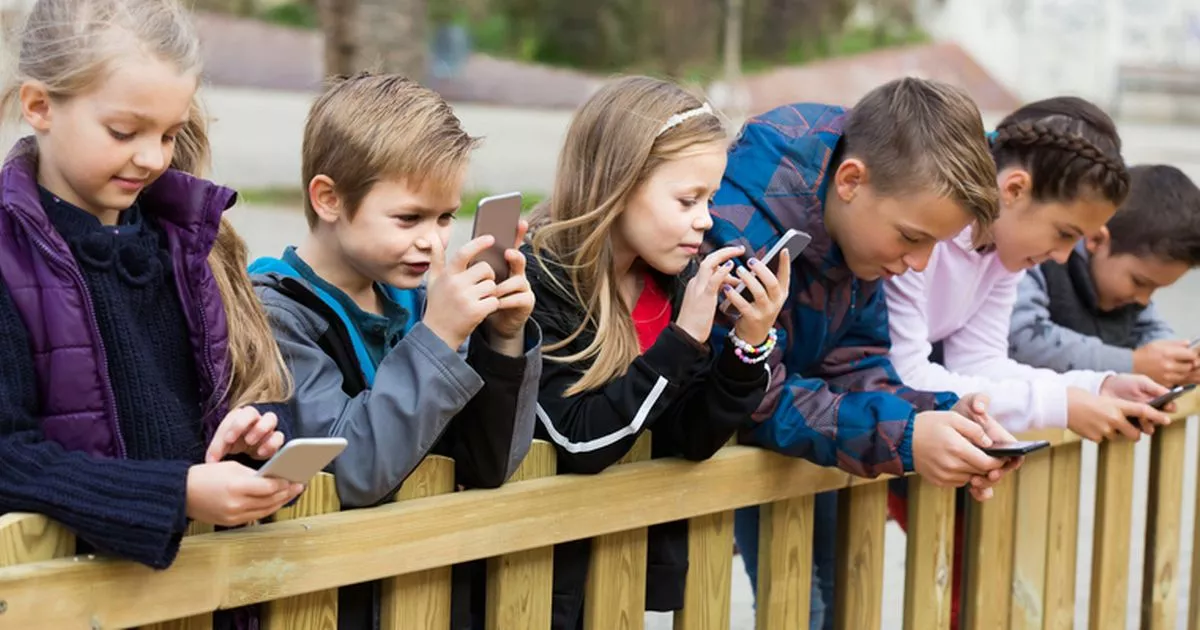“Parents massively over-estimate dangers in the real world and massively under-estimate dangers in the digital world” A stock image of children looking at phones(Image: Getty)
A stock image of children looking at phones(Image: Getty)
Children look set to be banned from taking smart phones into two primary schools on the edge of Bristol from September, after a teacher found the WhatsApp group for Year 6 pupils had 9,000 notifications in just one night.
The discovery, along with emerging scientific evidence of the harm smartphones are doing to children, sparked a lengthy discussion and consultation with parents and staff at two primary schools in Emersons Green, which has culminated in a decision to ban them outright from both schools.
Children at Blackhorse Primary School will not be allowed to bring smartphones to school with them, in a move that executive headteacher Simon Botten said had been backed by the majority of parents, albeit with reservations from some.
A similar ban at Blackhorse’s sister school Emersons Green will be decided in the coming weeks.
Writing on his blog, SouthGlosHead, Mr Botten explained how the teachers at both schools gradually came to the conclusion that smartphones were on balance not a good thing for primary school-age children, and they worked for more than a year with parents to research the issue and discuss what they could do.
For the past couple of years, pupils had been allowed to bring smartphones to school, but had to hand them in to the teacher during lesson time.
One of the triggers for this, Mr Botten said, was an incident where a pupil forgot to pick up their phone after the last lesson of the day, and the smartphone remained in the teacher’s cupboard overnight.
“The teacher picked up the phone, waking it, only to see a notification of 9,000 missed messages from the Year 6 pupil WhatsApp group overnight. Nine thousand messages in a 15-hour overnight period,” Mr Botten said.
READ MORE: Tech addiction expert says WhatsApp bullying is a huge problem in Bristol primary schoolsREAD MORE: Smartphone addiction is like ‘heroin’ with teens being ‘hypnotised’
“After nearly two decades in headship, I have watched this technological phenomenon unfold slowly,” he said. “At first it was imperceptible: the odd argument via old-fashioned texts, the odd child seeing something online which they shouldn’t (always at home). But over the years I have seen the risks grow ever more significant and ever more frequent.
“A rise in cyberbullying on WhatsApp; of primary school aged children sending inappropriate images to one another; of children retreating into an online world and seeing less and less of their actual friends in actual parks; of children glued to their phones the moment they are given them back at the end of the day.
“And then something much darker. A rise in predatory strangers approaching children online in their bedrooms whilst their parents watch Eastenders downstairs. Near miss, after near miss. But, the thing is, if you have enough near misses – the chances of a collision rises to 100 per cent,” he added.
“So around a year ago, we started a debate at Blackhorse and Emersons Green. We sought to answer a simple question: should our schools become Smartphone free?” he said.
 Blackhorse Primary School head teacher Simon Botten
Blackhorse Primary School head teacher Simon Botten
The school brought in specialists from the police to talk to parents about the dangers of children being unsupervised online.
“The first step we took was to ask Avon & Somerset Police to lead a workshop for parents on the harms – in terms of sexual and criminal abuse – which they see as a result of predatory individuals approaching young people locally online,” said Mr Botten.
“The parents, well over 100 from Blackhorse alone, sat in stunned silence. By the time the second repeat event at Emersons took place another 50 or so Blackhorse parents attended that one too – as word spread about the plain-talking police officer laying out for parents some of the real-world risks which they saw play out in Bristol every day.
“The police had far greater impact here than any educationalist. By the end there was a feeling in the room that something must be done – although at that point we didn’t know what,” he added.
The school set up groups of parents at each school to discuss the issue, and then consulted with parents more widely about the possibility of an outright ban – no child can bring a smartphone to school at all. Some parents had concerns, said Mr Botten.
“The safety argument was fairly understandable: how will I know my child is safe whilst walking to/ from school if I can’t contact them?” the executive headteacher said.
“Interestingly, we had several parents who were also police officers attend these discussions and their voices proved very persuasive, arguing that parents massively over-estimate dangers in the real world and massively under-estimate dangers in the digital world.
“We navigated this argument by agreeing that, if a child had to walk to school alone, then they could bring in a simple ‘brick’ phone (texts and calls only) which could be bought for as little as £10. We also reminded parents that the IMS app on their phone showed when their child was registered each day, and the school would always phone them (as we alway have done) if their child didn’t arrive at school.
“The second argument was centred around liberty and the school over-reaching its authority to dictate whether parents bought their child a smartphone. Quite rightly, the parents pointed out (in the nicest possible way) that this was none of the school’s business.
“We countered this argument by explaining that we would not be preventing parents buying their child a smartphone, just preventing them bringing it to school. We made it clear that this was to support parents who wished to delay buying their child a smartphone by removing the peer pressure which existed on the playground before school where children would flaunt their smartphone prior to handing it in.
“It made it clear that the school would not tacitly condone smartphone ownership by collecting in children’s phones each morning and then handing them back at the end of the day,” he added.
Finally a poll was conducted which showed 87 per cent of parents at the larger Blackhorse Primary School in favour of the outright ban, while at Emersons Green Primary it was a lot more split – 58 to 42 in favour of the ban.
Governors at Blackhorse had the ultimate decision, and they voted that the ban is to come into force in September. Governors at Emersons Green are yet to have their vote.
“Since announcing the result, I have had zero emails from parents complaining about the ban, whereas I have had a good many parents thank the school for taking a stand,” said Mr Botten.
 Bristol Live WhatsApp Breaking News and Top Stories
Bristol Live WhatsApp Breaking News and Top Stories
Join Bristol Live’s WhatsApp community for top stories and breaking news sent directly to your phone
Bristol Live is now on WhatsApp and we want you to join our community.
Through the app, we’ll send the latest breaking news, top stories, exclusives and much more straight to your phone.
To join our community you need to already have WhatsApp. All you need to do is click this link and select ‘Join Community’.
No one will be able to see who is signed up and no one can send messages except the Bristol Live team.
We also treat community members to special offers, promotions and adverts from us and our partners. If you don’t like our community, you can check out at any time you like.
To leave our community, click on the name at the top of your screen and choose ‘Exit group’.
If you’re curious, you can read our Privacy Notice.
Click here to join our WhatsApp community.
